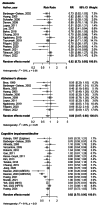Fish consumption, cognitive impairment and dementia: an updated dose-response meta-analysis of observational studies
- PMID: 39162889
- PMCID: PMC11335789
- DOI: 10.1007/s40520-024-02823-6
Fish consumption, cognitive impairment and dementia: an updated dose-response meta-analysis of observational studies
Abstract
Background: Cognitive impairment is projected to affect a preponderant proportion of the aging population. Lifelong dietary habits have been hypothesized to play a role in preventing cognitive decline. Among the most studied dietary components, fish consumptionhas been extensively studied for its potential effects on the human brain.
Aims: To perform a meta-analysis of observational studies exploring the association between fish intake and cognitive impairment/decline and all types of dementia.
Methods: A systematic search of electronic databases was performed to identify observational studies providing quantitative data on fish consumption and outcomes of interest. Random effects models for meta-analyses using only extreme exposure categories, subgroup analyses, and dose-response analyses were performed to estimate cumulative risk ratios (RRs) and 95% confidence intervals (CIs).
Results: The meta-analysis comprised 35 studies. Individuals reporting the highest vs. the lowest fish consumption were associated with a lower likelihood of cognitive impairment/decline (RR = 0.82, 95% CI: 0.75, 0.90, I2 = 61.1%), dementia (RR = 0.82, 95% CI: 0.73, 0.93, I2 = 38.7%), and Alzheimer's disease (RR = 0.80, 95% CI: 0.67, 0.96, I2 = 20.3%). The dose-response relation revealed a significantly decreased risk of cognitive impairment/decline and all cognitive outcomes across higher levels of fish intake up to 30% for 150 g/d (RR = 0.70, 95% CI: 0.52, 0.95). The results of this relation based on APOE ε4 allele status was mixed based on the outcome investigated.
Conclusions: Current findings suggest fish consumption is associated with a lower risk of cognitive impairment/decline in a dose-response manner, while for dementia and Alzheimer's disease there is a need for further studies to improve the strength of evidence.
Keywords: Alzheimer’s disease; Cognitive status; Dementia; Fish; Meta-analysis.
© 2024. The Author(s).
Conflict of interest statement
A.D. is an employee of Bolton Food S.P.A. The other authors have no competing interests to disclose.
Figures
References
-
- GBD 2019 Diseases and Injuries Collaborators (2020) Global burden of 369 diseases and injuries in 204 countries and territories, 1990–2019: a systematic analysis for the global burden of Disease Study 2019. Lancet 396:1204–1222. 10.1016/S0140-6736(20)30925-9 10.1016/S0140-6736(20)30925-9 - DOI - PMC - PubMed
-
- GBD 2017 Disease and Injury Incidence and Prevalence Collaborators (2018) Global, regional, and national incidence, prevalence, and years lived with disability for 354 diseases and injuries for 195 countries and territories, 1990–2017: a systematic analysis for the global burden of Disease Study 2017. Lancet 392:1789–1858. 10.1016/S0140-6736(18)32279-7 10.1016/S0140-6736(18)32279-7 - DOI - PMC - PubMed
-
- GBD 2019 Dementia Forecasting Collaborators (2022) Estimation of the global prevalence of dementia in 2019 and forecasted prevalence in 2050: an analysis for the global burden of Disease Study 2019. Lancet Public Health 7:e105–e125. 10.1016/S2468-2667(21)00249-8 10.1016/S2468-2667(21)00249-8 - DOI - PMC - PubMed
Publication types
MeSH terms
LinkOut - more resources
Full Text Sources
Medical
Miscellaneous



